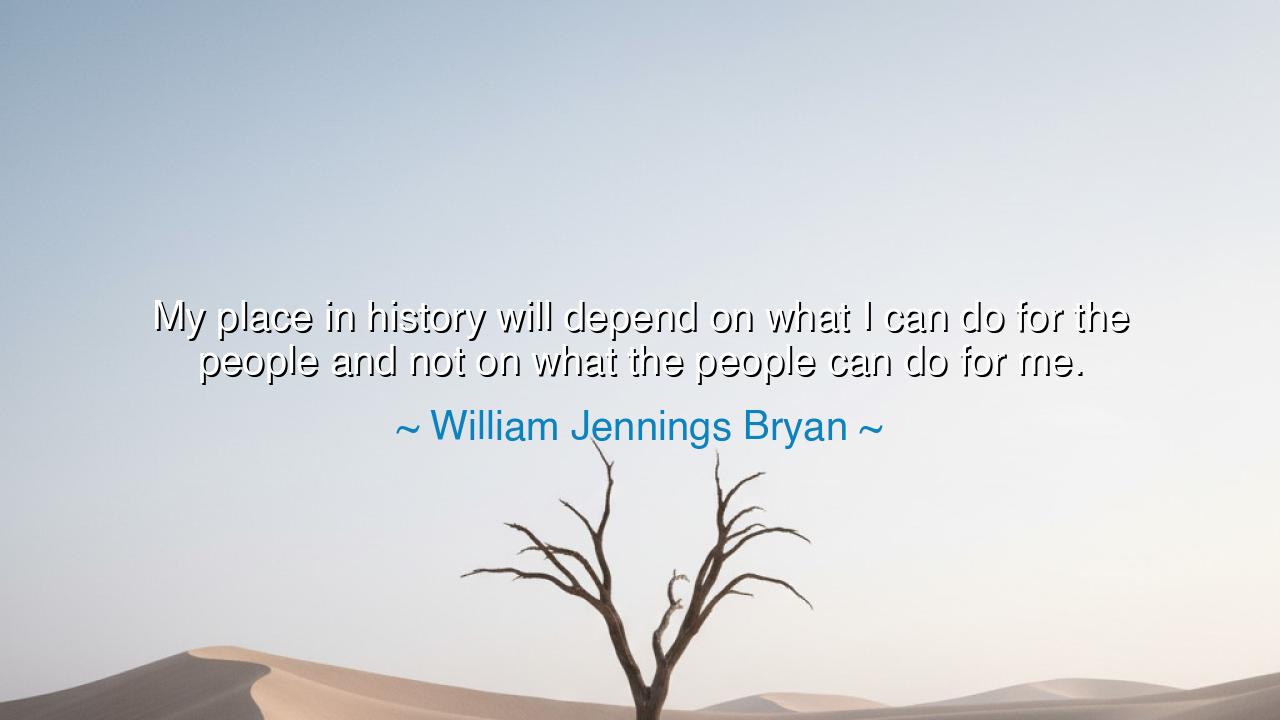
My place in history will depend on what I can do for the people
My place in history will depend on what I can do for the people and not on what the people can do for me.






“My place in history will depend on what I can do for the people and not on what the people can do for me.” – William Jennings Bryan
In these solemn and enduring words, William Jennings Bryan speaks as one who understood the sacred covenant between power and purpose, between leadership and service. His declaration is not the boast of a man seeking fame, but the humble creed of one who saw greatness not in glory, but in giving. He understood that a true legacy is not carved in marble nor written in books, but in the hearts and hopes of those whose lives one has uplifted. The measure of a life, he reminds us, is not what one receives from the multitude, but what one offers in their name.
Born in an age of turmoil and transformation, Bryan’s voice rose amid the storms of the late nineteenth century — a time when industry thundered, wealth concentrated, and the cries of the common man echoed unheard. He became the “Great Commoner,” not because he was born to power, but because he chose to stand among the people. His words and deeds sprang from the conviction that public service is sacred, that leadership is stewardship, not possession. In his quote, one can hear the echo of eternal truth: that honor belongs not to those who rule, but to those who serve with integrity.
The heart of Bryan’s message lies in the ethic of selflessness. Every age has those who seek to bend history toward their own advantage, to claim the applause of the moment without earning the reverence of posterity. But the wise know that such glory fades like smoke upon the wind. True remembrance is born of sacrifice, not ambition — of deeds that heal, uplift, and inspire. For when a man serves only himself, his name may glitter briefly; but when he serves others, his memory becomes immortal, shining through generations as a light of example.
History gives us proof of this truth. Consider Abraham Lincoln, whose name is not revered because of wealth or personal triumph, but because he bore the sorrows of a divided nation and gave his strength to mend it. He lived by the very spirit of Bryan’s words, seeking not what his country could give him, but what he could give to his country — justice, freedom, and unity. Even when burdened with grief and doubt, Lincoln stood steadfast in service, and thus his “place in history” was secured not by the laurels of conquest, but by the weight of his compassion.
There is a sacred irony here — that those who chase greatness rarely find it, while those who serve with humility stumble upon it unaware. Bryan’s declaration is a warning against the vanity that so often infects leadership and the hearts of those who crave recognition. He teaches that history’s true judgment is moral, not material. Statues crumble, fortunes vanish, but a single act of kindness — a single voice raised for justice — endures. The glory of the self fades, but the glory of service is everlasting.
To live by this wisdom is to embrace a harder, higher calling. It means to labor not for applause but for impact; to speak not to be heard, but to heal; to lead not for power, but for purpose. It is to measure success not by what one gains, but by what one gives. In every home, every city, every nation, this principle holds true — for teachers, leaders, and workers alike. The smallest deed done in love outlasts the grandest ambition rooted in pride.
So let this teaching pass to you, listener and reader of tomorrow: seek your place in service, not in spotlight. Ask not what the world owes you, but what good you might leave behind. Lift those who stumble, speak for those without voice, give to those without means. For in doing so, you shape not only your own destiny, but the destiny of all who follow.
And when your days are done, may it be said of you as it was of Bryan: that your place in history was not earned by self-seeking, but by self-giving; that you lived not to be remembered, but to make others’ lives worth remembering. In this lies the secret of all enduring greatness — that to serve is to shine, and to give is to be eternal.






AAdministratorAdministrator
Welcome, honored guests. Please leave a comment, we will respond soon